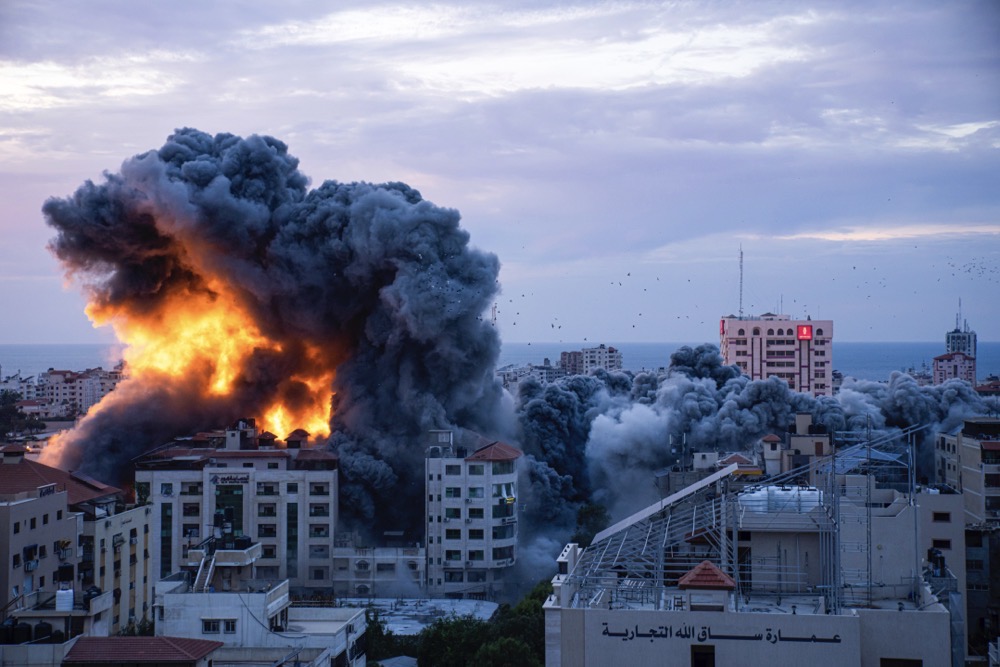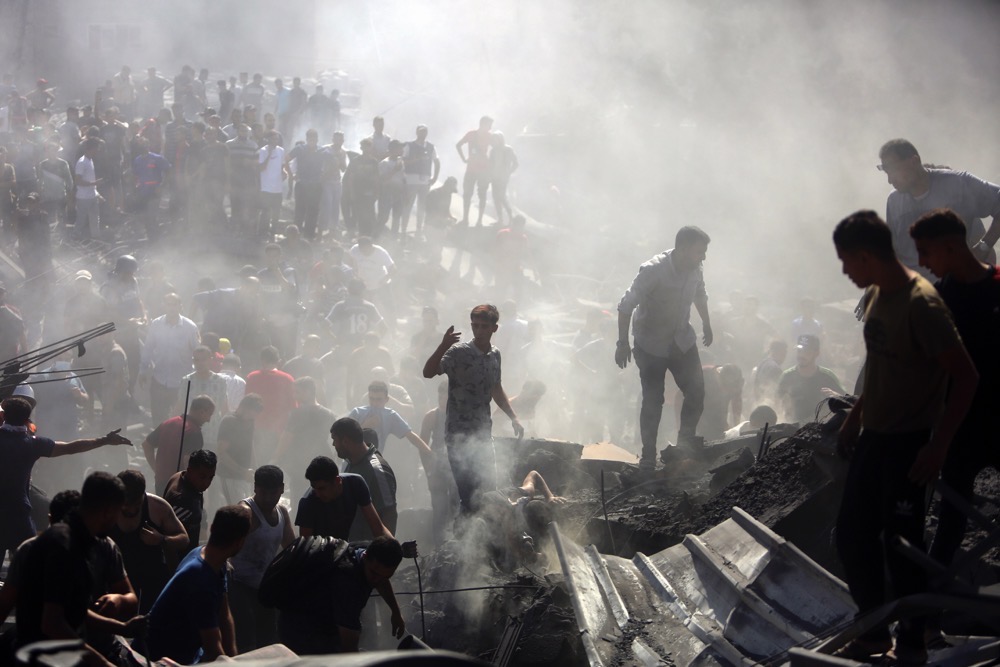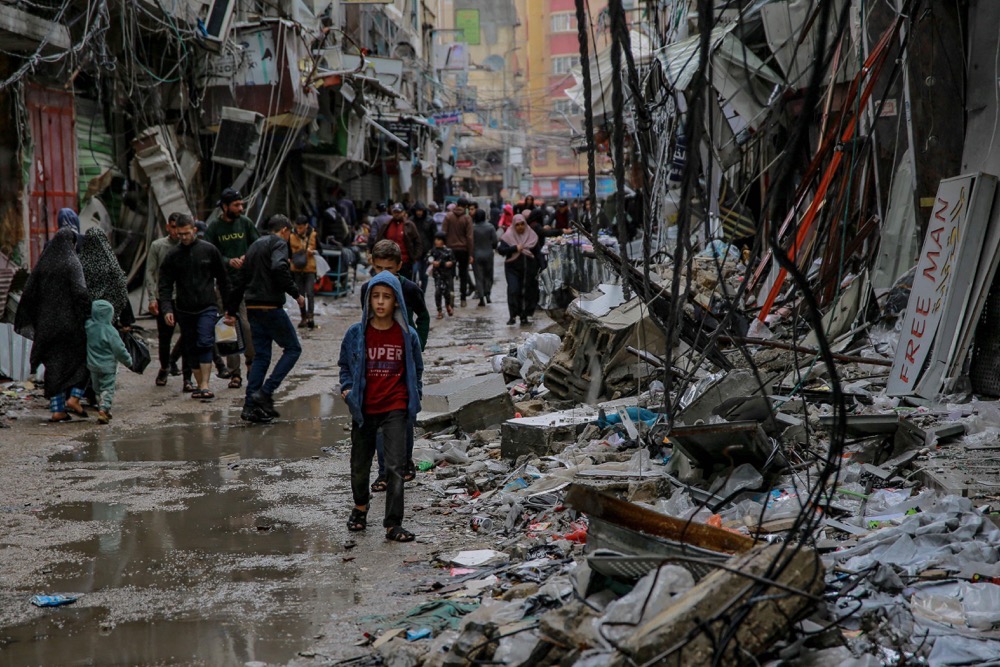LONDON: Following a seemingly successful pause in hostilities, questions are mounting over the fate of Palestinians displaced by the war in Gaza and what hopes they have of returning home if, and when, news breaks of a permanent cessation of hostilities.
In the more than 50 days of constant shelling, Israel’s military has turned much of northern Gaza into a moonscape with entire neighborhoods reduced to rubble.
The homes, hospitals and schools that remain standing are by no means fit to return to, with expectations that authorities will have to go house to house, building to building to determine what level of reconstruction Gazans require.
Yossi Mekelberg, professor of international relations and associate fellow of the MENA Program at Chatham House, told Arab News questions about Palestinians’ return were “heart-breaking.”
“It is a good question to ask but it is also a heart-breaking one because of the level and sheer scale of the destruction, and this is before the war has even been brought to an end and we still do not know if Israel intends to continue offensives further into the south,” Mekelberg said.

UK-based conflict monitor Airwars called the bombings the most intense since the Second World War
“We do know that some Gazans who fled their homes in the north have returned, or tried to return, to see whether their houses are still standing … they were not.”
Over the course of this latest eruption of violence in the more than 75-year-long conflict, it is believed that in excess of one million Palestinians have fled the north of Gaza, including from Gaza City, considered the urban center of the enclave.
Israel’s military may have described the air campaign as unavoidable but emphasizing the sheer scale, UK-based conflict monitor Airwars called it the most intense since the Second World War.
Director of Airwars Emily Tripp told Arab News that this assessment was based on drawing a comparison with the nine-month Battle of Mosul between 2016 and 2017 which, once it ended, had left 80 percent of the city uninhabitable according to the UN and other experts.
“At the time, the US assessed Mosul as the most intense urban battleground since the Second World War and our data shows no more than 6,000 munitions dropped in a single month,” Tripp said.
“If the initial IDF statement of 6,000 munitions dropped in that first week to 10 days holds true, then by the time of the temporary pause last week, it is likely that the IDF has dropped more munitions than the coalition in any month of the campaign against Daesh.”

“There are not enough resources to host over 1.1 million people in the other governorates,” said Oxfam policy lead Bushra Khalidi. (AP)
Speaking to PBS, Yousef Hammash, a Norwegian Refugee Council aid worker who fled south from the ruins of the Jabaliya refugee camp, said he saw no future for his children where they had ended up and wanted “to go home even if I have to sleep on the rubble of my house.”
A 31-year-old taxi driver, Mahmoud Jamal, told the same broadcaster that when he fled Beit Hanoun in northern Gaza, he “couldn’t tell which street or intersection I was passing.”
Efforts to keep up-to-date with the scale of damage are hampered by Israeli restrictions on access to Gaza, but in the second week of November the UN’s Office of the High Commissioner on Human Rights suggested at that point about 45 percent of housing stock had been destroyed.
Sources told Arab News that, despite the level of damage, it was “unsurprising” that many Palestinians in Gaza were wary of leaving their homes, but said it remained the safest option.
One said: “In an ideal world, civilians would be able to go somewhere for a short time and come back but there are always concerns that to say they should leave for their safety could be construed as supporting the contention that Israel is looking to ethnically cleanse Gaza.”
INNUMBERS
• 45 percent Fraction of Gaza housing stock destroyed.
• 6k Shells dropped in a single week in Gaza.
• 1.1m Gaza residents without homes or shelter.
According to Oxfam, those that have stayed number in the hundreds of thousands, even with repeated Israeli warnings for civilians to abandon the northern regions and head south.
Oxfam policy lead Bushra Khalidi, herself based in Ramallah, said Israel’s calls for civilians to relocate south, in the absence of any guarantee of safety or return, amounted to forcible transfer, describing it “as a grave breach of international humanitarian law that must be reversed.”
“There are not enough resources to host over 1.1 million people in the other governorates,” she told Arab News.
“Shelters, aid, water are already in low supply in the south. There is no guarantee that civilians will find refuge in other parts of Gaza. Those who stay behind in northern Gaza cannot be deprived of their protection as civilians.
“The US, UK, EU and other Western and Arab countries that have influence over the Israeli political and military leadership must demand Israel immediately rescind the order to relocate.”

Israel’s military has turned much of northern Gaza into a moonscape with entire neighborhoods reduced to rubble. (AP)
In the face of an apparent lack of leadership from those in positions to influence Israel’s actions in Gaza, the Israeli Defense Forces seems to be in no mood for leniency, having urged those Gazans to have already relocated to relocate again, this time to Muwasi on the coast.
For his part, Mekelberg, noting that when it came to this conflict there was a tendency for the “temporary to become permanent,” said the question becomes one of “where next for Palestinian civilians?”
With 70 percent of Gaza’s prewar population already classified as refugees after having been displaced from other parts of Palestine at various stages of the decades-long conflict, Israel’s intelligence service seemed to have answered that with reported plans to send them to Sinai.
The proposal, subsequently denied by the Israeli government, drew sharp condemnation from Palestinians and Egypt, with Mekelberg citing the latter’s concern of Hamas fighters entering.
“We know that what starts as temporary becomes permanent, and we know this because, 75 years on, there are still Palestinians, who having been displaced in 1946, are still in other countries and this reality is compounding the difficulties of housing refugees,” he said.
Opinion
This section contains relevant reference points, placed in (Opinion field)
Such concerns have been reflected in statements by Arab leaders. Jordan’s King Abdullah has been direct in saying there were to be “no refugees in Jordan,” while the country’s foreign minister has warned Israel not to leave a mess for other countries to clear up.
Mekelberg said that “if governments suspect this war of being an Israeli effort to ethnically cleanse Gaza,” they would unsurprisingly be less than keen to help.”
Even so, he stressed that in the immediate term it was “paramount” to find safe harbor for the civilian population but given the surrounding politics and availability, or lack thereof, of much-needed humanitarian aid this was proving difficult.
Pointing to international humanitarian law, Khalidi said no country could refuse those fleeing war access and safe refuge.
Nonetheless, she also said states had to be cognizant of the fact that — given the Palestinians already displaced in Gaza and denied their right to return by Israel — any support they offered may inadvertently play into the hands of actors looking to ethnically cleanse the enclave.

“There is no guarantee that civilians will find refuge in other parts of Gaza,” said Oxfam policy lead Bushra Khalidi. (AFP)
With more questions than answers, Mekelberg said a complete rethink was required on how such situations were managed and the obligations and rights of those caught up in conflict.
“As far as Gazans in the present are concerned, winter isn’t coming, it is already there. If you have one instance of heavy rain pouring down and into a sewage system that before the Israeli bombing was struggling, what you will be left with is a huge health crisis,” he said.
“In the face of this, there must be a concerted international effort to establish refugee camps, to supply them with all that is needed, and to keep people safe.”
Right now, he said, we were witnessing a “very unhappy situation” but stressed international support had to be there when the fighting ends, with Gazans helped in both the rebuilding of their homes and, in cases where they were relocated, ensuring they got back to them.
Khalidi added: “An individual must have the right to live safely and peacefully in their homeland.”






























